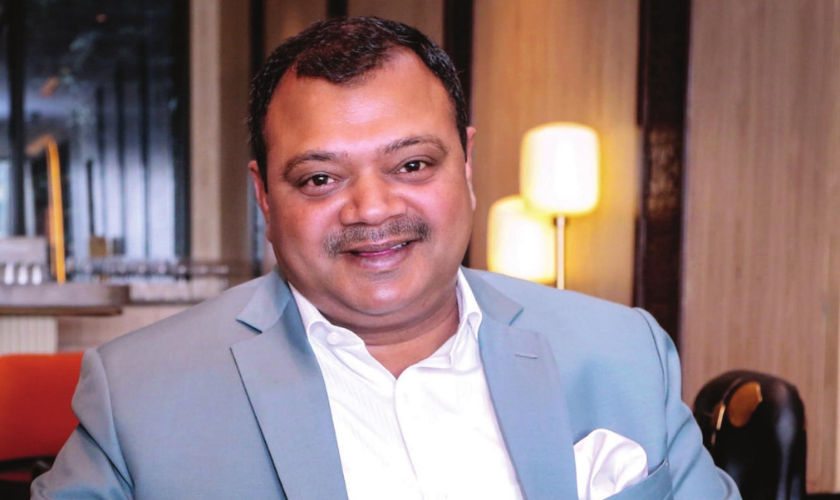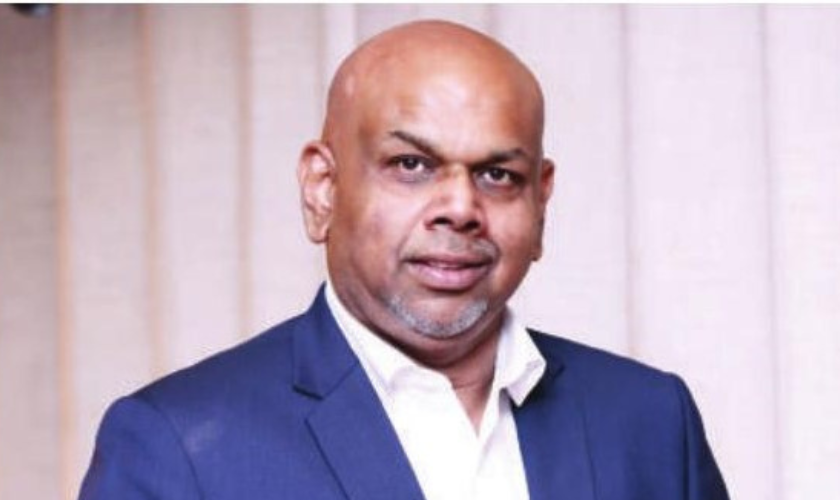As Nepal’s air conditioning market expands with rapid growth and shifting consumer demands, the country is emerging as a key focus for global industry leaders. Among those leading the charge is Sanjay Goyal , Senior Vice President of Daikin India who was recently in Nepal Nepal to deepen the company’s engagement with local partners and customers. With over three decades of partnership with Himal Refrigeration and Electricals, Daikin is now set to expand its presence by introducing advanced, eco-friendly cooling solutions tailored to Nepal’s evolving needs. In a conversation with Madan Lamsal of New Business Age, Goyal talked about his perspectives on market trends, Daikin’s strategic roadmap and the company’s commitment to sustainability and top-tier after-sales service in Nepal. Excerpts:
Q: What brings Daikin to Nepal this time, and what are your key objectives for the visit?
A: As you may know, India has been growing very strongly—not just in terms of domestic operations, but also as a hub for exports. Given Nepal’s excellent relationship with India, we see significant growth potential here as well. With that in mind, we wanted to reinforce Daikin’s presence in Nepal by showcasing our latest air conditioning technologies. We have partnered with Himal Refrigeration and Electricals, a trusted name in this market for over 25 years. By combining Daikin’s advanced technology with Himal Refrigeration’s strong customer relationships and local expertise, we aim to better serve customers in this rapidly growing market.
Q: How have you seen customer preferences and market trends evolve in Nepal over the past 5-10 years?
A: Customer behavior in Nepal is increasingly aligning with global trends. Today, customers are looking for advanced technologies that consume less energy, are more environmentally friendly, offer better control systems and provide ease of use. This shift has become especially noticeable over the past 10 years. At Daikin, we believe in going beyond just selling products—we engage closely with communities to understand local requirements, empower local stakeholders and build robust local networks.
Over the past few years, we have seen Daikin's presence in Nepal strengthen significantly. Our products are gaining preference and deeper market penetration. We are fast emerging as a dominant player in Nepal’s air conditioning sector. Nepali customers are becoming increasingly aware of energy-efficient technologies and are actively choosing products that help reduce carbon footprints. The demand for environmentally friendly, sustainable solutions is clearly rising.
Q: How does Daikin’s approach in South Asian markets, particularly Nepal, differ from its strategy in other regions?
A: Daikin’s approach is centered on bringing production closer to local markets and conducting research and development that caters to specific regional needs. Our strategy is built on the pillars of trust, collabouration and strong partnerships with our stakeholders—particularly our local partners in each market. What sets Daikin apart is its commitment to having everything in-house—from design to manufacturing—which is a unique feature compared to many of our competitors. This allows us greater control over quality and innovation.
These strategic principles—localization, in-house capabilities and stakeholder collabouration—are not only applied in South Asia but are part of our global approach, helping differentiate Daikin across markets. We also deeply value and appreciate the role of our local distributors, who are essential to our success in markets like Nepal.
Q: Could you tell us about Daikin’s distribution network in Nepal, particularly your partnership with Himal Refrigeration? How has it contributed to the performance of Daikin products in the market so far?
A: Himal Refrigeration is a brand in itself. They have been in business since the 1990s, and in Nepal, the term 'air conditioner' is often synonymous with Himal. Daikin’s association with Himal Refrigeration goes back over 30 years, and we take immense pride in this long-standing collabouration. It is not just a distributor relationship; it is a strategic partnership. Daikin has invested significantly in upskilling and educating Himal’s team. We have helped train a new generation of engineers within Himal Refrigeration, and their next-generation leadership has been trained at Daikin for over two years. This kind of knowledge transfer ensures sustainability and long-term growth.
We see strong growth potential in the Nepali market, thanks to the continued efforts and deep market penetration strategies of Himal Refrigeration. Under the guidance of both the Daikin India management and our export leadership, we are confident about the future. Today, Daikin holds a 58% market share in the VRV (Variable Refrigerant Volume) segment in Nepal, thanks largely to Himal Refrigeration’s efforts. With our combined commitment, we are aiming to take that to 75%. This is a shared vision that we have set with Kamal Chaudhary, who has been Daikin’s partner for more than three decades.
Q: How do you assess the air conditioning market in Nepal? What specific growth prospects and challenges do you see here?
A: Like many countries in the Global South, Nepal has seen a significant presence of Chinese air conditioning brands. While we have deep respect for these players, their focus on energy efficiency is often lacking. This is where Daikin sees a strong opportunity in the Nepali market. Our goal is to introduce energy-efficient air conditioning solutions, manufactured in India, that strike a balance between performance and affordability. We aim to offer what we call an ‘affordable premium’—products that are high in quality and energy efficiency, without being prohibitively expensive.
Together with Himal Refrigeration, we see an opportunity to educate customers about the long-term benefits of energy-efficient systems and promote our innovative technologies, which offer superior performance in terms of operating costs compared to many Chinese alternatives. Another key difference is our business model. Many Chinese brands follow a trading-only approach. In contrast, Daikin combines product sales with strong service support and after-sales care. We do not just sell air conditioners; we provide complete solutions. This is the foundation of our strategy: to build a long-term presence in end-user markets by offering value through performance, sustainability and service, rather than simply operating as a trading company.
Q: Have you observed a shift in Nepali consumer preferences toward energy-efficient and smart air conditioning systems? If so, how is Daikin responding to this trend? Which market segments are you prioritizing in this context?
A: We categorize the air conditioning market into three main verticals: residential, commercial and industrial. In the residential segment, we are currently at an early stage of market penetration in Nepal. However, in the commercial segment, Daikin holds a dominant leadership position. As for the industrial segment, we believe it is still in its early stages of development in Nepal, and our penetration there is just beginning.

Regarding your question on energy-efficient technologies, yes, this is a growing trend among Nepali consumers and we are well-positioned to meet that demand. Daikin is globally recognized as a leader in inverter technology, which is at the core of energy-efficient air conditioning.
In Nepal, we also hold over 60% market share in VRV (Variable Refrigerant Volume) systems, which are both energy-efficient and environmentally friendly. In addition, we offer the latest technology in chillers designed for high performance and sustainability. All these products are tailored to meet the growing demand for energy-efficient, eco-friendly air conditioning solutions across various customer segments in the Nepali market.
Q: When it comes to energy efficiency and green technology, which products or features is Daikin emphasizing in the Nepali market?
A: We are focusing on three key product categories. For residential applications, we emphasize inverter technology, which offers the highest energy efficiency. Daikin’s inverter ACs have received multiple global and national awards, including recognition in India, for their performance and sustainability.
For commercial applications, our focus is on VRV (Variable Refrigerant Volume) systems. These not only provide excellent energy efficiency but also offer advanced control and ease of operation. Likewise, for large-scale commercial and industrial needs, we offer a full range of energy-efficient chillers, including centrifugal and screw chillers. These systems are designed to deliver high performance while minimizing energy consumption.
Q: What about other technologies, such as inverter ACs or similar solutions?
A: As I mentioned earlier, Daikin is a leader in inverter AC technology. The key advantage of an inverter AC is that it does not operate at a fixed speed. Instead, the compressor speed adjusts based on the cooling load required. This variable speed operation significantly reduces energy consumption. Daikin is widely recognized as a pioneer and leader in this technology.
Q: A major customer concern in Nepal is after-sales service. How does Daikin ensure strong service support and localization to address this issue?
A: First, we already have an excellent skill development center in India, along with multiple Centers of Excellence across the country, that focus on training and upskilling our teams. We are establishing a Center of Excellence in Nepal as well to provide the latest technology training locally. The primary aim of this is to enhance after-sales service for our customers.
Meanwhile, the Himal Refrigeration team regularly travels to India for advanced training to stay updated with the latest technologies to ensure better service for customers here. Additionally, we are working closely with Himal Refrigeration to improve the availability of spare parts to ensure timely and efficient service.
Q: Are there localized efforts, such as product configuration, pricing or service, to better address the unique needs of Nepali consumers?
A: We take a holistic approach, covering not just products but also after-sales service, training and skill development. It is a 360-degree strategy tailored for the Nepal market. The seminar, we organized during this visit, itself was organized to underline these commitments. Regarding investments, we do not hesitate to say that Daikin invests where there is volume and potential, always with a long-term perspective. At this stage, setting up an assembly unit in Nepal is not yet viable. However, investments related to service infrastructure and skill development are definitely planned for the near future as the market grows.
Q: How do you envision the future of cooling solutions evolving in countries like Nepal?
A: As a leader in the air conditioning industry, Daikin believes it is time to communicate more actively with our consumers, dealers, and stakeholders about the importance of choosing energy-efficient air conditioning solutions. It is crucial for Nepali consumers to understand that the decision isn’t just about the initial price but also about the long-term impact, including reducing their carbon footprint.
In recent decades, we have witnessed the challenges of global warming and rising temperatures worldwide. My message to Nepali consumers is: when choosing air conditioners, please prioritize energy efficiency and environmentally friendly refrigerants, such as Daikin’s R32 refrigerant, which is a green refrigerant available in Nepal and the region.
While other companies also offer R32 units, Daikin takes pride in providing the widest range of R32 refrigerant split units in the market. Energy efficiency is an essential requirement, and we are committed to bringing the benefits of energy-efficient air conditioners to consumers in Nepal.
(This interview was originally publihsed in July 2025 issue of New Business Age Magazine.)











